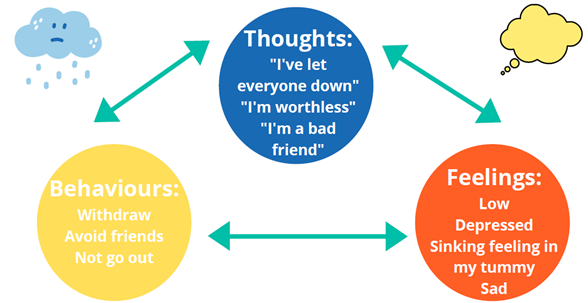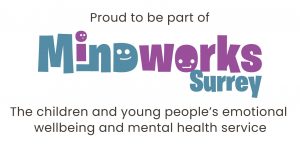YMCA East Surrey’s Emotional Wellbeing and Mental Health team offers three specialist evidence-based therapies for adolescents.
Cognitive Behavioural Therapy (CBT)
What is CBT?
CBT is a type of talking treatment that focuses on how your thoughts, beliefs and attitudes affect your feelings and behaviours. It teaches you coping skills to deal with different problems. CBT combines cognitive therapy (examining the things you think) with behaviour therapy (examining the things you do). It is a here and now therapy, so you will look at what is currently keeping your difficulties going. You might also explore the past to understand the impact it has had.
How does CBT work?
CBT is based on the idea that the way you think about situations can affect the way you feel and behave. For example, if you interpret a situation negatively, you might experience negative emotions as a result. These bad feelings might then lead you to behave in a certain way. This can then become a vicious cycle that is difficult to break. We can look at it like this:

What will happen in my CBT session?
Meetings with your therapist will be private and usually last for 50 minutes. You will be offered a safe and non-judgemental space to explore what is going on for you in the here and now.
At the start of treatment, you will ‘map’ out your difficulties and create specific goals to work towards throughout therapy. At the start of each session, you and your therapist will put together an agenda for the session. Depending on your focus, together you will work through different worksheets, questionnaires and tasks which will help you learn different coping strategies. For these strategies to work, it is important you engage in ‘in-between session tasks’ which your therapist will set you, to strengthen your learning. To get the best possible outcome, you must be willing and able to engage in your sessions and work collaboratively with your therapist.
Most young people are offered the opportunity to come for around 8 weekly sessions with one of our CBT therapists.
What kinds of problems can CBT help with?
- Anxiety: Confronting fears in a gradual and manageable way. Exploring coping strategies.
- Low mood/depression: Recording thoughts. Incorporating valued activities into your week.
- Sleep: Challenging difficult thoughts.
- Phobias: Gradual exposure to feared situations.
- Problems relating to others: Checking assumptions about other people’s motivation for doing things.
Interpersonal Psychotherapy for Adolescents (IPT-A)
What is IPT-A?
IPT-A is an evidence-based treatment specially developed for dealing with Depression in Children and Young People.
IPT-A focuses on the relationship difficulties that are often very important to young people and that are frequently identified as key features of their depression stories.
The focus of this type of therapy will be on current conflicts, role changes, losses and difficulties in establishing and maintaining independent and satisfying relationships that so often trigger and maintain episodes of depression. IPT-A aims to reduce depressive symptoms and improve relationships through a collaborative process of psychoeducation, understanding depression in the context of relationships with other people, developing skills in identifying and expressing feelings and moods and communicating more effectively.
IPT-A is mainly an individual therapy but relationships can be more fully explored through additional sessions with parents/carers.
What will happen in my IPT-A session?
With your therapist, you will talk about your symptoms; how you feel and what is happening in your relationships week-by-week. Your therapist will support you to make positive changes. You will be helped to get back into routines that might have felt more difficult since your depressive symptoms started.
Children's Wellbeing Practitioners
YMCA East Surrey’s Children’s Wellbeing Practitioner (CWP) team are trained to offer guided self-help to children and young people with mild to moderate anxiety, low mood and common behavioural problems.
CWPs are part of YMCA East Surrey’s wider Emotional Wellbeing and Mental Health service and work within the local community, GPS, and schools. They can support children and young people between the ages of 4-18 using either a parent-led or child/young person-led intervention.
CWPs use Cognitive Behavioural Therapy (CBT) principles to normalise emotions and develop helpful patterns of thought, feeling & behaviour via guided self-help interventions.
CWPs can help with:
- Children and young people who want help with their problem and are motivated to engage with the intervention.
- Mild to moderate anxiety including phobias (for example animals, vomit, agoraphobia), social anxiety, separation anxiety, school avoidance and excessive worry.
- Mild to moderate low mood, depression and low self-esteem.
- Sleep difficulties resulting from poor sleep routine, anxiety or low mood.
- Poor diet or eating patterns that could be affected by, or causing, low mood.
CWPs can't help if:
- The young person is already engaged in a different intervention.
- The young person doesn’t think there is a difficulty.
- There is extreme risk involved (e.g. self-harm) or if the problem is more than mild to moderate.
- There is a formal diagnosis of Autistic Spectrum Disorder, or a severe learning disability.
- The young person has an eating disorder.
- The main problem is obsessive compulsive disorder, post-traumatic stress disorder or panic disorder.
What about the cost?
Our service is free to all clients.
What about confidentiality?
We know how important it is for young people to feel confident they can trust their therapist. Nothing you tell us will be passed on to anyone outside the agency or our NHS partners, without your consent, unless we think that you or any other person will be in danger. Even then, we would try to talk to you about it first.
How do I book an appointment?
To access support, please seek a referral from your GP, school, or other health professional.
If you require further information, you can phone YMCA East Surrey’s Emotional Wellbeing and Mental Health Team on 01737 378481, or email headstog@ymcaeastsurrey.org.uk.

